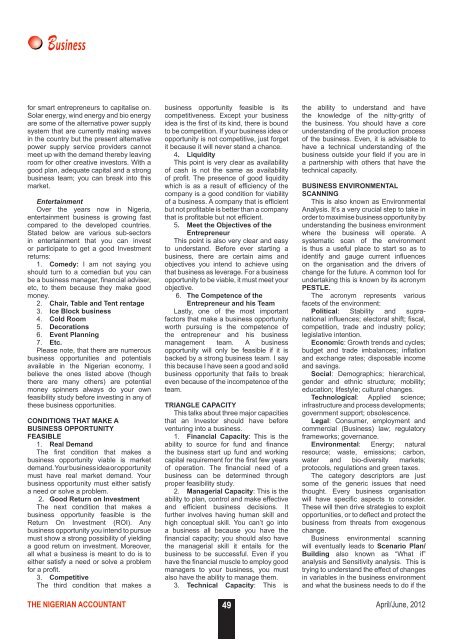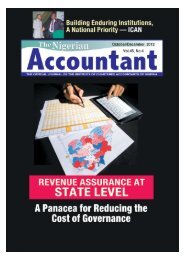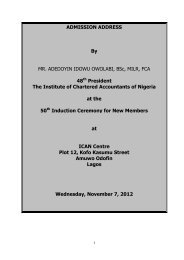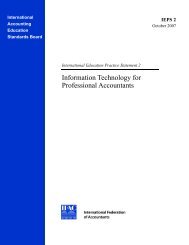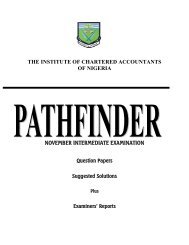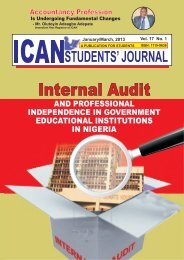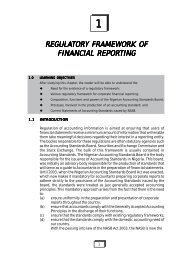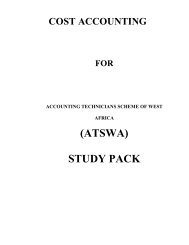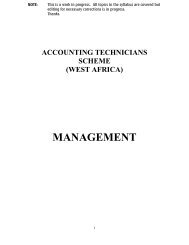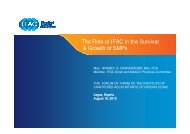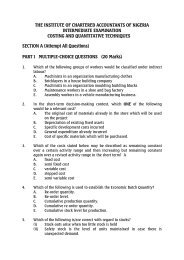The Nigerian Accountant 2012 - The Institute of Chartered ...
The Nigerian Accountant 2012 - The Institute of Chartered ...
The Nigerian Accountant 2012 - The Institute of Chartered ...
Create successful ePaper yourself
Turn your PDF publications into a flip-book with our unique Google optimized e-Paper software.
Business<br />
for smart entrepreneurs to capitalise on.<br />
Solar energy, wind energy and bio energy<br />
are some <strong>of</strong> the alternative power supply<br />
system that are currently making waves<br />
in the country but the present alternative<br />
power supply service providers cannot<br />
meet up with the demand thereby leaving<br />
room for other creative investors. With a<br />
good plan, adequate capital and a strong<br />
business team; you can break into this<br />
market.<br />
Entertainment<br />
Over the years now in Nigeria,<br />
entertainment business is growing fast<br />
compared to the developed countries.<br />
Stated below are various sub-sectors<br />
in entertainment that you can invest<br />
or participate to get a good Investment<br />
returns:<br />
1. Comedy: I am not saying you<br />
should turn to a comedian but you can<br />
be a business manager, financial adviser,<br />
etc, to them because they make good<br />
money.<br />
2. Chair, Table and Tent rentage<br />
3. Ice Block business<br />
4. Cold Room<br />
5. Decorations<br />
6. Event Planning<br />
7. Etc.<br />
Please note, that there are numerous<br />
business opportunities and potentials<br />
available in the <strong>Nigerian</strong> economy, I<br />
believe the ones listed above (though<br />
there are many others) are potential<br />
money spinners always do your own<br />
feasibility study before investing in any <strong>of</strong><br />
these business opportunities.<br />
CONDITIONS THAT MAKE A<br />
BUSINESS OPPORTUNITY<br />
FEASIBLE<br />
1. Real Demand<br />
<strong>The</strong> first condition that makes a<br />
business opportunity viable is market<br />
demand. Your business idea or opportunity<br />
must have real market demand. Your<br />
business opportunity must either satisfy<br />
a need or solve a problem.<br />
2. Good Return on Investment<br />
<strong>The</strong> next condition that makes a<br />
business opportunity feasible is the<br />
Return On Investment (ROI). Any<br />
business opportunity you intend to pursue<br />
must show a strong possibility <strong>of</strong> yielding<br />
a good return on investment. Moreover,<br />
all what a business is meant to do is to<br />
either satisfy a need or solve a problem<br />
for a pr<strong>of</strong>it.<br />
3. Competitive<br />
<strong>The</strong> third condition that makes a<br />
business opportunity feasible is its<br />
competitiveness. Except your business<br />
idea is the first <strong>of</strong> its kind, there is bound<br />
to be competition. If your business idea or<br />
opportunity is not competitive, just forget<br />
it because it will never stand a chance.<br />
4. Liquidity<br />
This point is very clear as availability<br />
<strong>of</strong> cash is not the same as availability<br />
<strong>of</strong> pr<strong>of</strong>it. <strong>The</strong> presence <strong>of</strong> good liquidity<br />
which is as a result <strong>of</strong> efficiency <strong>of</strong> the<br />
company is a good condition for viability<br />
<strong>of</strong> a business. A company that is efficient<br />
but not pr<strong>of</strong>itable is better than a company<br />
that is pr<strong>of</strong>itable but not efficient.<br />
5. Meet the Objectives <strong>of</strong> the<br />
Entrepreneur<br />
This point is also very clear and easy<br />
to understand. Before ever starting a<br />
business, there are certain aims and<br />
objectives you intend to achieve using<br />
that business as leverage. For a business<br />
opportunity to be viable, it must meet your<br />
objective.<br />
6. <strong>The</strong> Competence <strong>of</strong> the<br />
Entrepreneur and his Team<br />
Lastly, one <strong>of</strong> the most important<br />
factors that make a business opportunity<br />
worth pursuing is the competence <strong>of</strong><br />
the entrepreneur and his business<br />
management team. A business<br />
opportunity will only be feasible if it is<br />
backed by a strong business team. I say<br />
this because I have seen a good and solid<br />
business opportunity that fails to break<br />
even because <strong>of</strong> the incompetence <strong>of</strong> the<br />
team.<br />
TRIANGLE CAPACITY<br />
This talks about three major capacities<br />
that an Investor should have before<br />
venturing into a business.<br />
1. Financial Capacity: This is the<br />
ability to source for fund and finance<br />
the business start up fund and working<br />
capital requirement for the first few years<br />
<strong>of</strong> operation. <strong>The</strong> financial need <strong>of</strong> a<br />
business can be determined through<br />
proper feasibility study.<br />
2. Managerial Capacity: This is the<br />
ability to plan, control and make effective<br />
and efficient business decisions. It<br />
further involves having human skill and<br />
high conceptual skill. You can’t go into<br />
a business all because you have the<br />
financial capacity; you should also have<br />
the managerial skill it entails for the<br />
business to be successful. Even if you<br />
have the financial muscle to employ good<br />
managers to your business, you must<br />
also have the ability to manage them.<br />
3. Technical Capacity: This is<br />
the ability to understand and have<br />
the knowledge <strong>of</strong> the nitty-gritty <strong>of</strong><br />
the business. You should have a core<br />
understanding <strong>of</strong> the production process<br />
<strong>of</strong> the business. Even, it is advisable to<br />
have a technical understanding <strong>of</strong> the<br />
business outside your field if you are in<br />
a partnership with others that have the<br />
technical capacity.<br />
BUSINESS ENVIRONMENTAL<br />
SCANNING<br />
This is also known as Environmental<br />
Analysis. It’s a very crucial step to take in<br />
order to maximise business opportunity by<br />
understanding the business environment<br />
where the business will operate. A<br />
systematic scan <strong>of</strong> the environment<br />
is thus a useful place to start so as to<br />
identify and gauge current influences<br />
on the organisation and the drivers <strong>of</strong><br />
change for the future. A common tool for<br />
undertaking this is known by its acronym<br />
PESTLE.<br />
<strong>The</strong> acronym represents various<br />
facets <strong>of</strong> the environment:<br />
Political: Stability and supranational<br />
influences; electoral shift; fiscal,<br />
competition, trade and industry policy;<br />
legislative intention.<br />
Economic: Growth trends and cycles;<br />
budget and trade imbalances; inflation<br />
and exchange rates; disposable income<br />
and savings.<br />
Social: Demographics; hierarchical,<br />
gender and ethnic structure; mobility;<br />
education; lifestyle; cultural changes.<br />
Technological: Applied science;<br />
infrastructure and process developments;<br />
government support; obsolescence.<br />
Legal: Consumer, employment and<br />
commercial (Business) law; regulatory<br />
frameworks; governance.<br />
Environmental: Energy; natural<br />
resource; waste, emissions; carbon,<br />
water and bio-diversity markets;<br />
protocols, regulations and green taxes.<br />
<strong>The</strong> category descriptors are just<br />
some <strong>of</strong> the generic issues that need<br />
thought. Every business organisation<br />
will have specific aspects to consider.<br />
<strong>The</strong>se will then drive strategies to exploit<br />
opportunities, or to deflect and protect the<br />
business from threats from exogenous<br />
change.<br />
Business environmental scanning<br />
will eventually leads to Scenario Plan/<br />
Building also known as “What if”<br />
analysis and Sensitivity analysis. This is<br />
trying to understand the effect <strong>of</strong> changes<br />
in variables in the business environment<br />
and what the business needs to do if the<br />
THE NIGERIAN ACCOUNTANT 49<br />
April/June, <strong>2012</strong>


